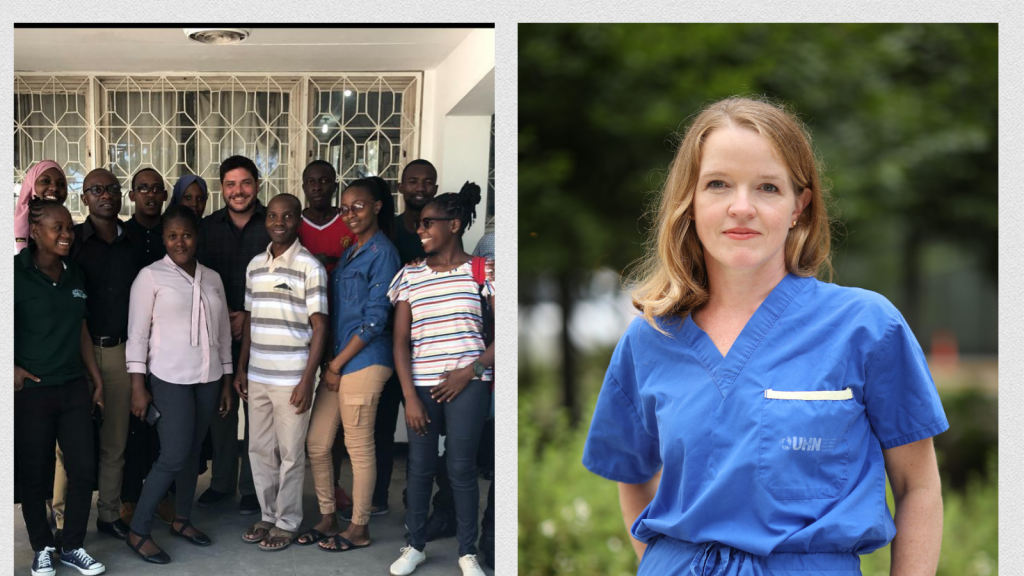For decades the Lawrence Bloomberg Faculty of Nursing has been a leader in graduate education. This fall, the Faculty of Nursing has expanded its rigorous academic programming and welcomed its first cohort of students into the inaugural Doctor of Nursing (DN) program, a first-of-its kind in Canada.
“This is an exciting time for the Faculty, the University, and for nurses in leadership,” says Linda Johnston, dean of the Lawrence Bloomberg Faculty of Nursing and a leader in the development of the DN program.
“We have recognized an appetite for doctoral education, among nurses in clinical and educational leadership roles, both here in Canada and around the world.”
Different from the traditional Doctor of Philosophy (PhD), the DN program offers nurses in leadership and executive positions a doctoral education that teaches them to apply new knowledge into practice, education, and policy, much-needed skills in a fast-paced and technologically evolving health care and education system.
To develop and execute their dissertation, students will be provided with a strong foundation in implementation science, which specifically focuses on how newly generated knowledge from research can be applied in real-world clinical and educational settings.
“There is often a gap between what we know, and what we do in practice,” says Bonnie Stevens, professor at the Lawrence Bloomberg Faculty of Nursing, and co-developer of the DN program. Stevens will be teaching a course on implementation science that focuses on evaluating strategies for implementing and disseminating new knowledge and engages students in the development of a knowledge translation plan teaching them how to execute that plan to targeted audiences and with multiple partnerships.
“My interest in knowledge translation came from my own frustrations at seeing research not used in practice settings,” says Stevens who is also associate chief of nursing research at The Hospital for Sick Children, and researches interventions for treating acute pain in infants and children. “Through the DN program, we have an opportunity to strengthen leadership capacity in nurses within clinical practice and education. This is a really strong group of students to do that with,” says Stevens. “I’m excited about the possibilities.”
Andrew McLellan was part of the focus group for the DN program over five years ago and is now one of the first students to take part in the newly launched doctoral degree. He has taught at the University of Sierra Leone and University of Zimbabwe and has a keen interest in strengthening health systems around the world through nursing education. Currently in Tanzania, where he is a lecturer at Muhimbili University of Health and Allied Sciences as well as a teacher at the University of Global Health Equity in Rwanda, McLellan is looking forward to enhancing his knowledge as a nursing educator and developing improved ways to implement competency-based education models.
“I have seen the pitfalls of lecturer- focused or content-based education, rather than competency and student-centered curricula,” says McLellan who is also an adjunct lecturer at the Lawrence Bloomberg Faculty of Nursing and graduate of the Master of Science in Nursing program at the University of Ottawa. “There can be a theory to practice gap, where the theoretical knowledge gained by students in the classroom meets barriers to its application in the student’s clinical learning environment.”
McLellan will examine barriers to implementing a competency-based curriculum as part of his ongoing doctoral work in the DN program. As a nurse practitioner and nurse educator, he feels strongly that nurses should consider leadership roles within their health care organization but also as clinical experts and educators.
“Nurses are the largest health care worker group in every health system, they are the ones providing that direct care to the patient. Getting their perspective and building their leadership capacity so that they can be a part of designing health systems is key to improving health care globally,” says McLellan.
Nikki Marks who is also one of the new students in the DN cohort, has long been focused on improving the health and quality of life for her patients who receive lung transplants. As an advanced practice nurse, Marks is hoping to explore how people can self-manage their care following solid organ transplants using technology that incorporates a patient’s entire care team, an idea that first came to light during the COVID-19 pandemic.
Throughout the pandemic, Marks worked with a number of colleagues at University Health Network, and she witnessed different models of care being employed by nurses to help patients manage their illness particularly once they were discharged. She was also involved in co-creating a program for patients diagnosed with COVID, that used biometric monitoring via video or phone, so that patients could remain isolated but stay connected with their care team and community partners.
“It struck me that so many of the nurses I was working with had amazing ideas to help people,” says Marks who is also a graduate of the Master of Nursing program. “It made me want to explore how as a nurse, I could have a larger impact on the care of patients. In my practice environment there is a lot of focus on medical research with physicians as team leads, but I think nurses could and should be leading too.”
For Marks, the DN program offers that perfect balance of enabling her to work on leadership competencies, create and implement innovative ways of caring for patients, and also continue to work as a nursing leader.
“With a Doctor of Nursing (DN) I’m going to be able to lead with focus,” says Marks “and help nurses investigate and demonstrate how they can have an impact on health at all levels.”
